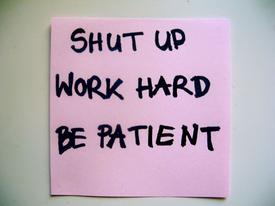How To Repair A Damaged Metabolism - Stavation Mode
Replies
-
bump0
-
Nice post, thanks.0
-
Do you have a link for this article??0
-
 :happy:
:happy:  0
0 -
bump0
-
Great Article.0
-
bump...thanks for the information!0
-
BUMP0
-
bump0
-
Thanks x0
-
This sounds like it's all about me, thanks for posting! I will read later and am willing to try something different at this point!!0
-
BUMP! and a sincere thanks!0
-
great post, I was eating between 850 and 950 only 3 days ago, I was never hungry, had plenty of energy and I was losing weight ... but I know it wont last lol so I am in the process of upping my cals to 1200 ..... Once i get there I will work out if I should go higher,
The wee hint about the carbs pre work out is a good one, deffo don't want those carbs turning to fat
Thanks for that post0 -
saving!0
-
bump0
-
It took me years to get to a place where I am now surprised by how many calories I get to eat!0
-
Great read!!Thanks..:)0
-
bump. thanks!0
-
bump0
-
bump0
-
Thanks for this!
 0
0 -
Bookmarking - thanks!0
-
The problem is many people here for instance are convinced that if they eat 1200 calories or less and don't eat back their exercise calories, they are heading right for starvation mode. And this is false, because in order to hit starvation mode, you must actually lose significant weight first. Instead we see people exercising 5 days a week and eating 1200 calories and not losing any weight. The more than likely scenario is that people are under-estimating their calorie intake and over-estimating their calories burned, as this can be demonstrated by research.
And a damaged metabolism is unfortunately a permanent reality for pretty much everybody who is severely overweight. Once you lose a lot of weight, you will end up leptin deficient, which is a key contributor to starvation mode and subsequent weight regain, and it is unavoidable no matter how slowly you lose weight. Leptin is an anti-starvation hormone that shuts down bodily functions and slows down metabolism when fat stores are being depleted. Not only is leptin affected, but also ghrelin, insulin and other hormones are thrown off balance when losing weight, and can last for a year or more if not indefinitely, at least that's whats been observed through research.
So you really can't repair a damaged metabolism. You have to find a way to manage your body's desire to gain weight for the rest of your life. You will forever be at a disadvantage to people who are naturally skinny.0 -
bomp0
-
Bump0
-
Thank you0
-
The problem is many people here for instance are convinced that if they eat 1200 calories or less and don't eat back their exercise calories, they are heading right for starvation mode. And this is false, because in order to hit starvation mode, you must actually lose significant weight first. Instead we see people exercising 5 days a week and eating 1200 calories and not losing any weight. The more than likely scenario is that people are under-estimating their calorie intake and over-estimating their calories burned, as this can be demonstrated by research.
And a damaged metabolism is unfortunately a permanent reality for pretty much everybody who is severely overweight. Once you lose a lot of weight, you will end up leptin deficient, which is a key contributor to starvation mode and subsequent weight regain, and it is unavoidable no matter how slowly you lose weight. Leptin is an anti-starvation hormone that shuts down bodily functions and slows down metabolism when fat stores are being depleted. Not only is leptin affected, but also ghrelin, insulin and other hormones are thrown off balance when losing weight, and can last for a year or more if not indefinitely, at least that's whats been observed through research.
So you really can't repair a damaged metabolism. You have to find a way to manage your body's desire to gain weight for the rest of your life. You will forever be at a disadvantage to people who are naturally skinny.
While I agree that studies show that former overweight people who have lost weight tend to have slightly lower metabolisms, I think it's about 5% slower, IIRC. However, I disagree that it is inevitable and it's probably not permanent. You say yourself that the effects can last up to a year re the hormonal changes and I believe that could be true if someone is eating a large deficit. I suspect that smaller deficits have far less impact on those hormones..
Currently, I am focusing more on repairing my metabolism than I am on weight loss at this time. I am gradually upping my calories and eating an amount that would have meant a weight gain in the past. While my weight loss has slowed, I'm still losing on this higher calorie amount. I never would have dreamed it was possible even just 6 months ago as I would have gained eating what I'm eating now and losing.0 -
Thanks for the info!0
-
wow this is so perfect for me!!0
-
Glad you found this informative.0
This discussion has been closed.
Categories
- All Categories
- 1.4M Health, Wellness and Goals
- 398.4K Introduce Yourself
- 44.7K Getting Started
- 261K Health and Weight Loss
- 176.4K Food and Nutrition
- 47.7K Recipes
- 233K Fitness and Exercise
- 462 Sleep, Mindfulness and Overall Wellness
- 6.5K Goal: Maintaining Weight
- 8.7K Goal: Gaining Weight and Body Building
- 153.5K Motivation and Support
- 8.4K Challenges
- 1.4K Debate Club
- 96.5K Chit-Chat
- 2.6K Fun and Games
- 4.7K MyFitnessPal Information
- 17 News and Announcements
- 21 MyFitnessPal Academy
- 1.5K Feature Suggestions and Ideas
- 3.2K MyFitnessPal Tech Support Questions

























